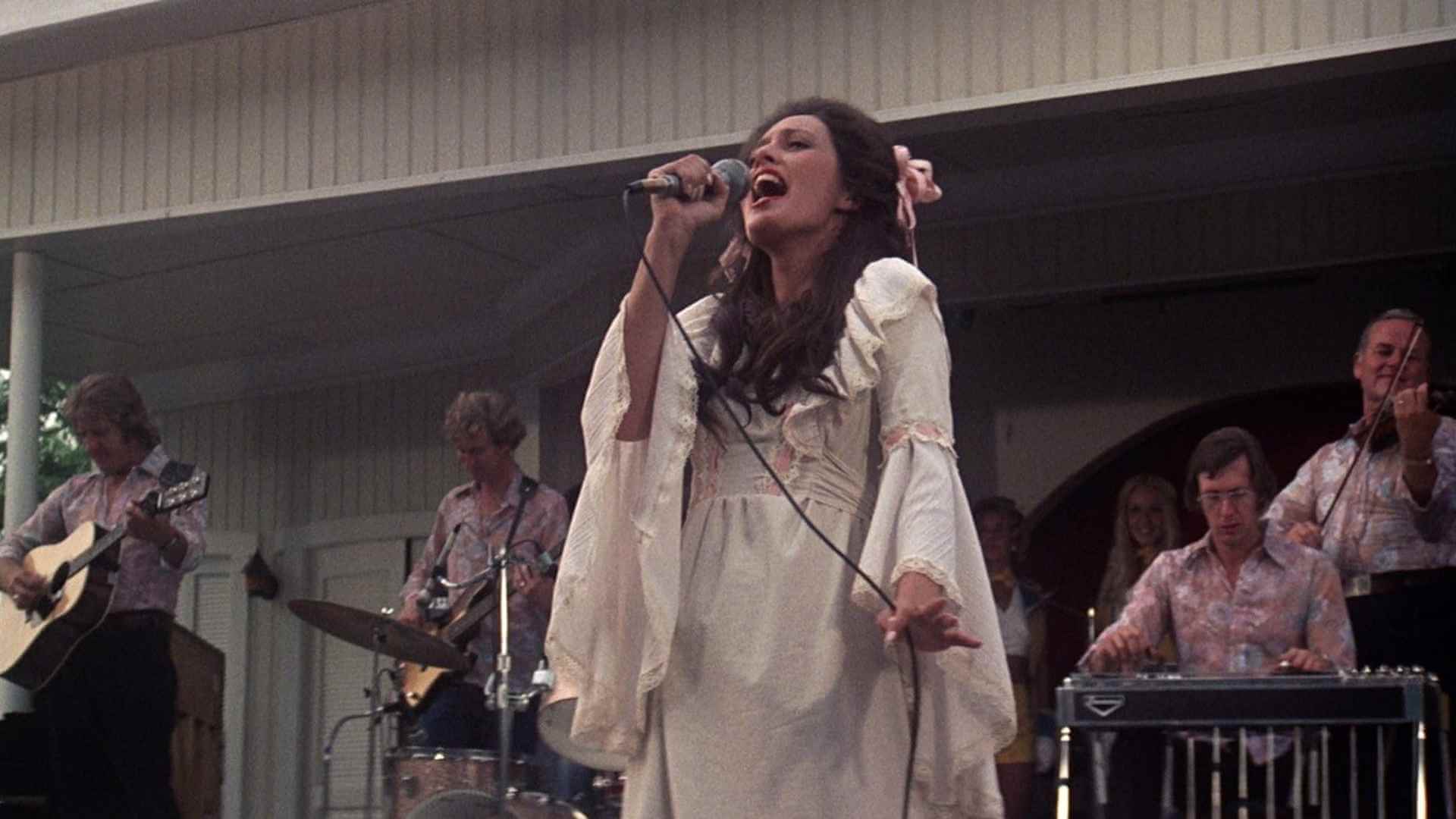On the Criterion Collection DVD commentary for Nashville, director Robert Altman matter-of-factly says at the beginning, “Nashville‘s a musical, really.” It almost sounds like he’s trying to convince himself that’s what he accomplished. But while it does have many musical moments, let’s not forget that it’s still a Robert Altman movie.
Released 50 years ago this month, Altman’s sprawling 1975 ensemble opus features musicians hustling and bustling around the town universally known as Music City. However, for much of the movie’s damn-near-three-hour length, music takes a backseat narrative-wise. In Altman’s version of the country-music mecca, there’s so much more going on. There’s a mysterious, populist presidential candidate looking to drum up support. There are local legends resting on their laurels, while struggling hopefuls strive to get noticed. There’s a pesky news reporter (Geraldine Chaplin) saying she’s from the BBC. There’s a mute magician (a very young Jeff Goldblum) riding on a three-wheel motorcycle. There’s adultery, racism, death, shouting, a freeway pileup, a lone gunman, and, for some reason, Elliott Gould and Julie Christie. Basically, there’s a whole lot of 1970s America (and—dare I say—a lot of present-day America) in Nashville. And, just like in the good ol’ U.S. of A., the music is here if you need it.
In the opening minutes (complete with a boisterous credits sequence that’s also a parody of those late-night, greatest-hits commercials of yesteryear), Altman immediately establishes how most of the music will be served: with tongue planted firmly in cheek. Two separate recording sessions are taking place. One features sequined country great Haven Hamilton (Henry Gibson) earnestly singing a patriotic, Bicentennial anthem called “200 Years.” (“We must be doing something right to last 200 years!”) The other sees lily-white gospel singer Linnea Reese (Lily Tomlin) whooping it up with an all-Black choir. I can’t help but think this is Altman showing pale-faced audiences the fun they can have if they stop acting so high-and-mighty and get to know people who are different from them.
Nashville doesn’t have a score, but music is always in the background. Even when local musicians are front-and-center, often performing live during nightclub scenes, Altman keeps his focus on the conversations being had by the various characters he and screenwriter Joan Tewkesbury sprinkle throughout the audience. In this version of Nashville, talent is something that’s not only rarely discussed, but often gets ignored. When supporting, non-musician characters quietly reveal their secret musical talents, nobody’s really paying attention.
Altman didn’t get actual country stars of the day to appear or even contribute music (which obviously rubbed a lot of country A-listers the wrong way). However, he did round up actors who were damn fine singer-songwriters. The soundtrack is littered with songs written by the actors who perform them. Gibson co-wrote “200 Years” with musical director Richard Baskin, who composed a couple other Hamilton numbers (and appears as the long-haired piano man Hamilton briefly berates). With Gibson providing vocals that teeter between pridefulness and pomposity, Baskin crafts stereotypically homespun standards for Hamilton. A performance at the Grand Ole Opry has the toupeed Hamilton tugging on the audience’s heartstrings with the maudlin “For The Sake Of The Children,” then getting them clapping and singing with the simple-as-it-sounds “Keep A-Goin.'”
Ronee Blakley already had a self-titled debut album in stores before Altman nabbed her for Loretta Lynn stand-in Barbara Jean. As a troubled diva who’s continually on the verge of a nervous breakdown (and the movie’s most tragic figure), Blakley comes up with tunes that are more straight-faced than Baskin and Gibson’s country claptrap. Although she relies on such familiar tropes as heartbreak, horsing around with cowboys, or—that ol’ standby—your momma and daddy, Blakley’s weary-but-dedicated performance (which landed her an Oscar nomination for Best Supporting Actress) makes her songs sound the most authentic. As Jean’s up-and-coming rival Connie White, Karen Black brings back the tongue-in-cheek tone with flagrantly absurd numbers she also composed. At the Opry, White sings her supposed hit “Memphis,” which is really just twangy nonsense (“I’d like to give you all I got, but I don’t know what that is”).
Nashville‘s most memorable numbers belong to Keith Carradine, who plays the lecherous third member of a Peter, Paul and Mary-esque trio. (Carradine and the two other members, played by Allan F. Nicholls and Carradine’s then-girlfriend Cristina Raines, do perform a tension-filled number penned by none other than Gary Busey.) Carradine’s Tim spends most of the movie in his hotel room, listening to demos for his solo album, hooking up with women (like Chaplin’s reporter), and trying to get with the married Reese. He finally gets a chance to serenade her in a nightclub scene where he sings the come-hithery acoustic number “I’m Easy,” which later earned Carradine an Oscar for Best Original Song. While several female characters in the club (including Shelley Duvall’s multi-wigged party girl) think he’s singing about them, it’s obvious he’s looking straight at Reese, sitting in the back.
“It Don’t Worry Me,” another Carradine-penned tune, is basically the de facto theme song of Nashville. Another song we first hear in Tim’s room, it eventually becomes a soothing sing-along (led by Barbara Harris’ wandering wannabe singer Albuquerque) after a shocking incident nearly disrupts an outdoor gala concert for that aforementioned presidential candidate.
But even though it ends with music literally saving the day, Nashville is still a musical where the music is mostly there to pacify. In the final moments, Altman catches the myriad faces in the crowd, literally singing their troubles away. And that’s “Me” Decade America in a nutshell, full of people blissfully, intentionally distracting themselves in order to forget how fucked up things can get around here. As someone who’s been listening to Apple Music just to keep my mind off everything, I can safely say that ain’t a damn thing changed.
